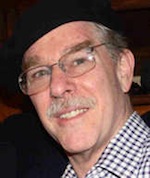 Evolution
Evolution
 Intelligent Design
Intelligent Design
More Reasons to Admire University of Chicago Microbiologist James Shapiro
 Around here we have a lot of respect for microbiologist James Shapiro, who had the guts and integrity to come over to ENV recently and spar over evolution with William Dembski, Doug Axe and Ann Gauger. Besides having a new book out that details his own dissatisfactions with conventional Darwinian evolutionary theory and that champions a provocative alternative view, Shapiro also blogs at the Huffington Post.
Around here we have a lot of respect for microbiologist James Shapiro, who had the guts and integrity to come over to ENV recently and spar over evolution with William Dembski, Doug Axe and Ann Gauger. Besides having a new book out that details his own dissatisfactions with conventional Darwinian evolutionary theory and that champions a provocative alternative view, Shapiro also blogs at the Huffington Post.
He continues to win our admiration, while evoking some poignancy as well.
In one post that got a fair amount of attention he had some sensible things to say to fellow evolutionists. Rather than hide behind “absolutist statements like ‘all the facts are on my side,'” as his University of Chicago colleague Jerry Coyne does, Shapiro advocates “active engagement” with Darwin critics. Enter into the controversy over evolution, he says, rather than pretend it doesn’t exist.
Perhaps even teach about it? Shapiro doesn’t go that far, but the permissibility of admitting the truth even to young people would seem to follow from his premise:
We need to demonstrate that evolution science is alive and well, as well as show how it is making remarkable progress through the application of molecular technologies — even though it does not have all the answers.
To the thoughtful scientist whose job is to uncover natural processes, this is surely a better way of advocating the scientific method than dogmatically asserting that we found all the scientific principles we need in centuries past.
Evolution supporters, he counsels, should admit they don’t have all the answers, including on a key question like the origin of life. In a remarkably candid statement, he writes:
In order to be truthful, we must acknowledge that certain questions, like the origins of the first living cells, currently have no credible scientific answer. However, given the historical record of science and technology in achieving the “impossible” (e.g., space flight, telecommunications, electronic computation and robotics), there is no reason to believe that unsolved problems will remain without naturalistic explanations indefinitely.
Surely there’s room to question Shapiro on why our ability to fly to the moon gives grounds for certainty that a purely “naturalistic” explanation of life’s origin will be forthcoming. Space flight is an accomplishment enacted in a material world but, more to the point, it’s a triumph of engineering — aka, intelligent design. It could not be accomplished at all without the direction of purposeful designers.
But note the implicit agreement with Stephen Meyer (Signature in the Cell: DNA and the Evidence for Intelligent Design): materialist explanations for “the origins of the first living cells” have, to date, indeed all miserably failed. In his book, Meyer shows how the evidence points persuasively to the action of some source of intelligent agency. Under the circumstances, if Shapiro is right, that would make intelligent design by default the lone viable theory of life’s origin.
Apart from gesturing to the advance of technology as a reason for keeping faith in naturalism, it would be interesting to know how Shapiro responds to Meyer’s case.
What’s poignant? Well, when defenders of any idea — whether it’s socialism, or Freudian psychology, or evolution — start talking about the need to show how their theory is “alive and well,” that’s typically an ominous sign. People only speak that way about ideas that are in fact moribund, not those that are actually in good health.
